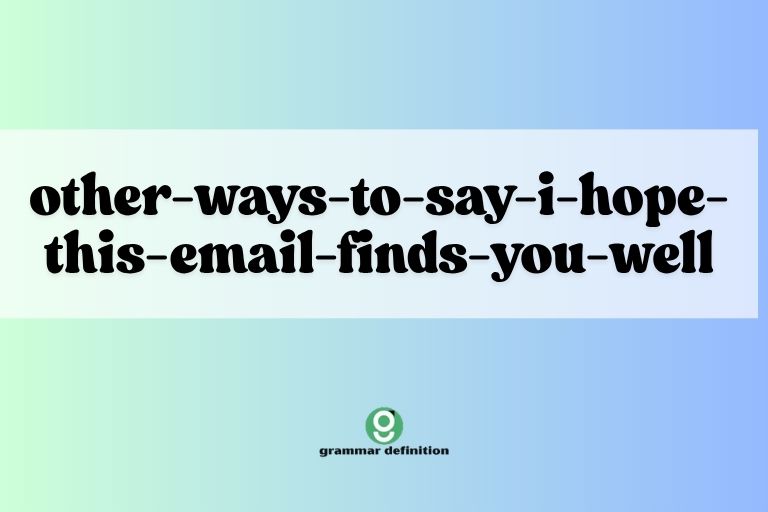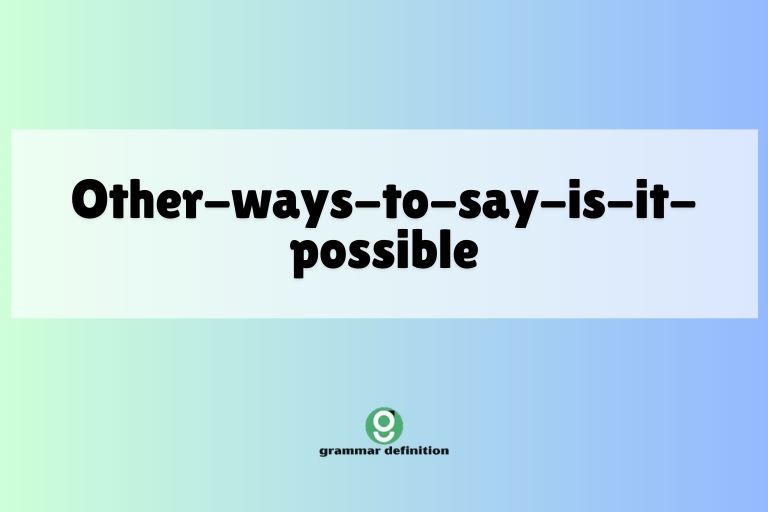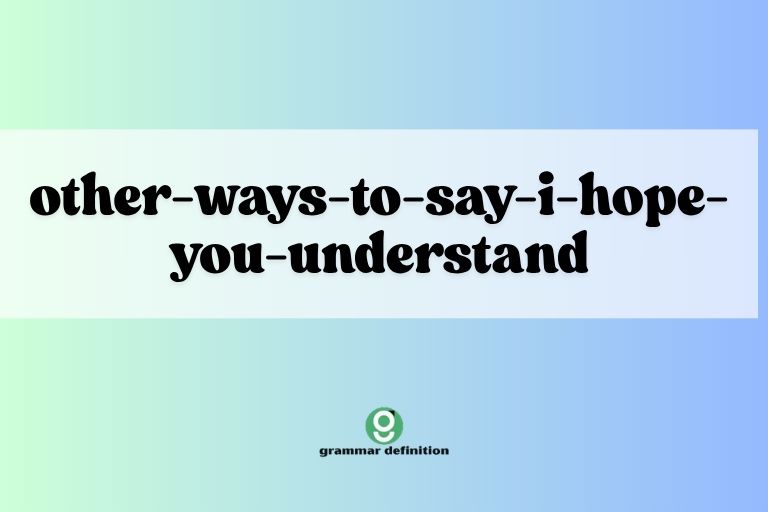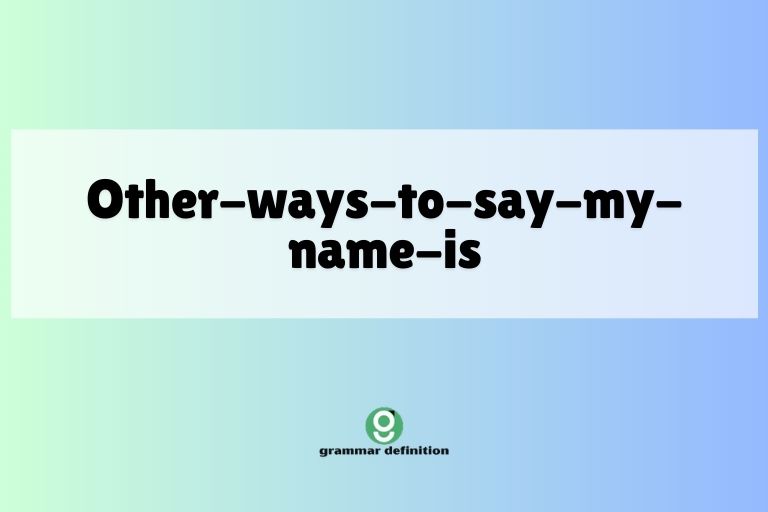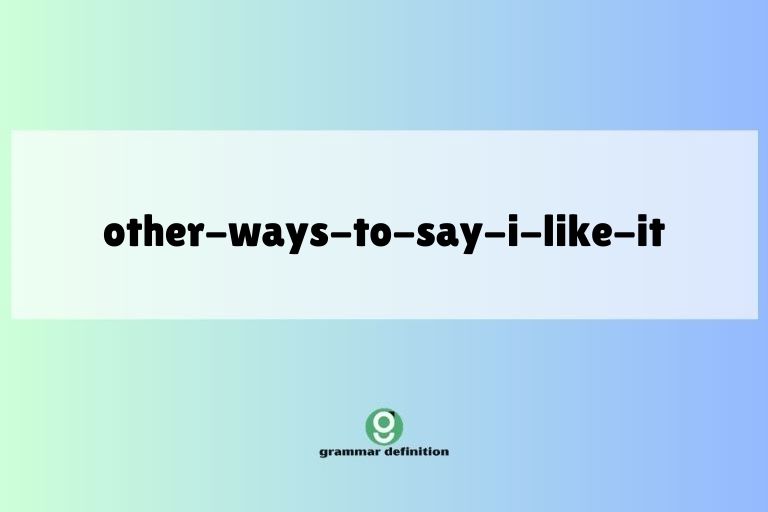Other Ways to Say “Work Closely With”: A Comprehensive Guide

Effective communication is crucial in any professional setting, and varying your language can significantly enhance your ability to connect with others. The phrase “work closely with” is commonly used, but over-reliance on it can make your language sound repetitive and uninspired.
This article explores a wide range of alternative expressions that convey the same meaning with greater nuance and precision. Mastering these alternatives will not only enrich your vocabulary but also improve your ability to articulate the nature of your collaborations, making you a more effective communicator.
This guide is suitable for students, professionals, and anyone looking to refine their English communication skills.
Table of Contents
- Introduction
- Definition of “Work Closely With”
- Structural Breakdown
- Types and Categories of Alternative Phrases
- Examples
- Usage Rules
- Common Mistakes
- Practice Exercises
- Advanced Topics
- FAQ
- Conclusion
Definition of “Work Closely With”
The phrase “work closely with” signifies a collaborative relationship where individuals or groups cooperate to achieve a common goal. It implies frequent interaction, shared responsibility, and a degree of interdependence.
This phrase is often used to describe professional relationships characterized by mutual support and shared objectives. The intensity of the interaction and the level of collaboration can vary depending on the context.
In terms of grammatical classification, “work” is a verb, and “closely” is an adverb modifying the verb, indicating the manner in which the work is performed. “With” is a preposition linking the verb to the person or group being collaborated with.
The entire phrase functions as a verb phrase describing the nature of the working relationship.
The phrase is versatile and can be used in various contexts, ranging from formal business reports to informal conversations. However, its frequent use can lead to redundancy, making it essential to explore alternative expressions that convey the same meaning with more precision and impact.
Structural Breakdown
The basic structure of the phrase “work closely with” is as follows:
Subject + Verb (“work”) + Adverb (“closely”) + Preposition (“with”) + Object (person or group)
For example:
I work closely with the marketing team.
Here, “I” is the subject, “work” is the verb, “closely” is the adverb, “with” is the preposition, and “the marketing team” is the object.
Alternative phrases often follow similar structures, but they may incorporate different verbs, adverbs, or prepositions to convey slightly different nuances. For instance, instead of an adverb-preposition combination like “closely with,” you might use a verb that inherently implies close collaboration, such as “collaborate with” or “partner with.” Understanding this structural breakdown allows for a more conscious and effective selection of alternative phrases.
Types and Categories of Alternative Phrases
There are numerous ways to express the idea of “working closely with,” each with its own subtle shade of meaning. These can be broadly categorized as follows:
Collaborative Phrases
These phrases emphasize the joint effort and shared responsibility involved in the working relationship. They often highlight the active participation of all parties involved.
Cooperative Phrases
These phrases focus on the willingness of individuals or groups to work together harmoniously. They emphasize mutual support and a shared commitment to achieving common goals.
Partnering Phrases
These phrases suggest a more formal and strategic alliance between parties. They often imply a long-term commitment and a shared investment in each other’s success.
Supportive Phrases
These phrases highlight the role of one party in assisting or aiding another. They emphasize the provision of resources, guidance, or encouragement.
Teamwork Phrases
These phrases emphasize the collective effort of a group working towards a common objective. They highlight the importance of communication, coordination, and shared responsibility.
Interactive Phrases
These phrases focus on the dynamic exchange and frequent communication between parties. They emphasize the ongoing dialogue and feedback that characterize the working relationship.
Examples
The following tables provide examples of alternative phrases for “work closely with,” categorized by the types described above. Each category includes a variety of options, allowing you to choose the most appropriate phrase for your specific context.
Collaborative Phrases Examples
The table below showcases various collaborative phrases that can replace “work closely with,” emphasizing joint effort and shared responsibility.
| Phrase | Example Sentence |
|---|---|
| Collaborate with | The engineers collaborate with the designers to create innovative products. |
| Jointly work with | We jointly work with external consultants on this project. |
| Work in tandem with | The sales and marketing teams work in tandem with each other to drive revenue. |
| Pool resources with | The two departments pool resources with each other to achieve their goals. |
| Unite efforts with | We will unite efforts with other organizations to combat climate change. |
| Act in concert with | The government agencies act in concert with local communities to address social issues. |
| Combine forces with | The research teams combine forces with universities to advance scientific knowledge. |
| Work hand in hand with | The nurses work hand in hand with the doctors to provide patient care. |
| Integrate efforts with | We integrate efforts with our partners to deliver comprehensive solutions. |
| Team up with | The athletes team up with each other to compete in the relay race. |
| Join forces with | The activists join forces with community leaders to advocate for social justice. |
| Cooperate with | The police cooperate with the FBI to solve complex crimes. |
| Liaise with | Our customer service team liaises with the technical support team. |
| Coordinate with | The project managers coordinate with the various stakeholders. |
| Participate with | Our company participates with various charities to give back to the community. |
| Engage with | The professor engages with the students in lively discussions. |
| Connect with | Our organization connects with other NGOs to provide support. |
| Network with | The business owners network with other entrepreneurs to expand their business. |
| Associate with | Our company associates with leading experts in the field. |
| Involve with | We will involve with the community members in the decision-making process. |
| Unite with | The countries unite with each other to promote global peace. |
| Merge with | The two companies merge with each other to create a larger entity. |
| Blend with | The artist blends with different colors to create a masterpiece. |
| Affiliate with | Our organization affiliates with various institutions to conduct research. |
Cooperative Phrases Examples
The table below presents cooperative phrases that emphasize harmonious working relationships and mutual support.
| Phrase | Example Sentence |
|---|---|
| Cooperate with | The two companies cooperate with each other on research and development. |
| Work in conjunction with | The software developers work in conjunction with the QA team to ensure quality. |
| Coordinate with | The event planners coordinate with the venue staff to ensure a smooth event. |
| Liaise with | The customer service representatives liaise with the technical support team. |
| Work in partnership with | The charity works in partnership with local businesses to raise funds. |
| Act in collaboration with | The museums act in collaboration with each other to preserve cultural heritage. |
| Work side by side with | The volunteers work side by side with the community members to rebuild the park. |
| Assist | The teaching assistant assists the professor with grading and classroom management. |
| Support | The IT department supports the entire organization with technical issues. |
| Aid | The medical staff aid the patients with their recovery. |
| Help | The tutors help the students with their homework. |
| Contribute to | Our team contributes to the success of the project. |
| Participate in | We participate in various community events. |
| Engage with | The CEO engages with the employees to understand their concerns. |
| Interface with | The application interfaces with the database to retrieve data. |
| Connect with | The social media manager connects with the followers online. |
| Network with | The sales representatives network with potential clients. |
| Associate with | The scientist associates with other researchers in the lab. |
| Collaborate on | We collaborate on various projects. |
| Work together on | The students work together on the assignment. |
| Cooperate on | The countries cooperate on the treaty. |
| Join forces on | The activists join forces on the campaign. |
| Team up on | The players team up on the game. |
| Unite on | The people unite on the issue. |
Partnering Phrases Examples
The following table lists partnering phrases that suggest a formal and strategic alliance, often implying a long-term commitment.
| Phrase | Example Sentence |
|---|---|
| Partner with | Our company partners with leading technology firms to develop innovative solutions. |
| Form an alliance with | The two universities form an alliance with each other to share resources and expertise. |
| Enter into a joint venture with | The construction companies enter into a joint venture with each other to build large-scale projects. |
| Forge a strategic partnership with | The hospital forges a strategic partnership with the research institute. |
| Team up with | The entrepreneurs team up with investors to launch their startup. |
| Collaborate with | The designers collaborate with the engineers to create new products. |
| Cooperate with | The countries cooperate with each other to promote trade and investment. |
| Work in collaboration with | The scientists work in collaboration with each other to unlock new knowledge. |
| Work in tandem with | The sales team work in tandem with the marketing team to boost revenue. |
| Join forces with | The activists join forces with each other to advocate for social change. |
| Connect with | The organization connects with volunteers to help the community. |
| Network with | The business owners network with other professionals to grow their business. |
| Associate with | The artists associate with each other to inspire creative endeavors. |
| Affiliate with | The university affiliates with various research centers to advance knowledge. |
| Unite with | The nations unite with each other to promote global peace. |
| Merge with | The two companies merge with each other to become a larger entity. |
| Consolidate with | The departments consolidate with each other to streamline operations. |
| Integrate with | The systems integrate with each other to improve efficiency. |
| Link up with | The researchers link up with other experts to share knowledge. |
| Establish a relationship with | The company establishes a relationship with suppliers to ensure quality. |
| Develop a partnership with | The organization develops a partnership with community leaders. |
| Build an alliance with | The countries build an alliance with each other for mutual support. |
| Cultivate a relationship with | The sales representative cultivates a relationship with clients. |
Supportive Phrases Examples
This table offers supportive phrases that highlight the role of one party in assisting or aiding another, emphasizing the provision of resources, guidance, or encouragement.
| Phrase | Example Sentence |
|---|---|
| Support | The IT department supports all the employees with their technical needs. |
| Assist | The teaching assistant assists the professor with grading assignments. |
| Aid | The volunteers aid the disaster victims with food and shelter. |
| Help | The tutors help the students with their homework. |
| Facilitate | The project manager facilitates communication between team members. |
| Enable | The new software enables the employees to work more efficiently. |
| Empower | The training program empowers the employees to take on new challenges. |
| Mentor | The senior employee mentors the junior employee to help them grow. |
| Guide | The advisor guides the students in their academic pursuits. |
| Advise | The consultant advises the company on strategic decisions. |
| Counsel | The therapist counsels the patients with their emotional issues. |
| Coach | The coach coaches the athletes to improve their performance. |
| Encourage | The parents encourage their children to pursue their dreams. |
| Motivate | The manager motivates the employees to achieve their goals. |
| Inspire | The leader inspires the team to reach their full potential. |
| Nurture | The organization nurtures young talents to develop their skills. |
| Foster | The school fosters a positive learning environment for the students. |
| Promote | The government promotes economic growth through various policies. |
| Bolster | The company bolsters its reputation through excellent customer service. |
| Reinforce | The teacher reinforces the students’ understanding through repetition. |
| Underpin | The research underpins the development of new technologies. |
| Sustain | The organization sustains its efforts through continuous funding. |
| Maintain | The team maintains a high level of performance. |
Teamwork Phrases Examples
The table below includes phrases that emphasize the collective effort of a group working towards a common objective, highlighting communication, coordination, and shared responsibility.
| Phrase | Example Sentence |
|---|---|
| Work as a team with | The project requires us to work as a team with members from different departments. |
| Collaborate as a group with | The students collaborate as a group with each other to complete the assignment. |
| Operate in sync with | The various departments operate in sync with each other to achieve the company’s goals. |
| Function as a unit with | The team functions as a unit with each member contributing their unique skills. |
| Work in unison with | The musicians work in unison with each other to create a beautiful symphony. |
| Pull together with | The community members pull together with each other to rebuild the town after the disaster. |
| Join forces as a team with | The athletes join forces as a team with each other to compete in the championship. |
| Band together with | The employees band together with each other to address workplace issues. |
| Unite as a team with | The countries unite as a team with each other to promote global peace. |
| Act in concert with | The organizations act in concert with each other to combat poverty. |
| Cooperate as a group with | The researchers cooperate as a group with each other to advance scientific knowledge. |
| Work hand in hand as a team with | The nurses work hand in hand as a team with the doctors to provide patient care. |
| Coordinate efforts as a group with | The volunteers coordinate efforts as a group with each other to organize the event. |
| Liaise as a team with | The customer service representatives liaise as a team with the technical support staff. |
| Engage as a team with | The marketing team engages as a team with the sales team to generate leads. |
| Interact as a team with | The engineering team interacts as a team with the designers to create innovative products. |
| Communicate effectively as a team with | The project managers communicate effectively as a team with the stakeholders. |
| Share responsibilities as a team with | The team members share responsibilities as a team with each other to ensure project success. |
| Support each other as a team with | The employees support each other as a team with their professional development. |
| Help each other as a team with | The students help each other as a team with their studies. |
Interactive Phrases Examples
The following table shows interactive phrases that focus on the dynamic exchange and frequent communication between parties, emphasizing ongoing dialogue and feedback.
| Phrase | Example Sentence |
|---|---|
| Interact with | The teacher interacts with the students to foster a positive learning environment. |
| Engage with | The company engages with its customers through social media. |
| Communicate with | The manager communicates with the team to provide updates and feedback. |
| Exchange information with | The scientists exchange information with each other at conferences. |
| Dialogue with | The leaders dialogue with each other to resolve conflicts. |
| Converse with | The friends converse with each other over coffee. |
| Correspond with | The pen pals correspond with each other through letters. |
| Network with | The professionals network with each other at industry events. |
| Interface with | The software interfaces with the database to retrieve information. |
| Connect with | The social media manager connects with followers online. |
| Relate to | The author relates to the audience through personal stories. |
| Touch base with | The team members touch base with each other regularly to discuss progress. |
| Keep in touch with | The friends keep in touch with each other despite being far apart. |
| Stay in contact with | The sales representative stays in contact with potential clients. |
| Follow up with | The recruiter follows up with candidates after the interview. |
| Consult with | The doctor consults with the specialist on the patient’s case. |
| Advise | The consultant advises the company on strategic decisions. |
| Guide | The mentor guides the mentee in their career development. |
| Feedback with | The manager provides feedback with the team members. |
| Share ideas with | The team members share ideas with each other in brainstorming sessions. |
| Exchange views with | The diplomats exchange views with each other to improve relationships. |
| Discuss with | The students discuss with each other the topic of the presentation. |
| Talk with | The friends talk with each other about their problems. |
Usage Rules
When choosing an alternative to “work closely with,” consider the specific context and the nuances you want to convey. Here are some general rules to follow:
- Formality: Some phrases are more formal than others. For example, “collaborate with” is generally more formal than “team up with.” Choose the phrase that is appropriate for your audience and the overall tone of your communication.
- Specificity: Some phrases are more specific than others. For example, “mentor” implies a specific type of supportive relationship, while “support” is more general. Choose the phrase that accurately reflects the nature of your working relationship.
- Emphasis: Different phrases emphasize different aspects of the working relationship. For example, “partner with” emphasizes the strategic nature of the relationship, while “cooperate with” emphasizes the willingness to work together harmoniously. Choose the phrase that highlights the most important aspect of your collaboration.
- Audience: Consider your audience. A highly technical audience might appreciate more precise, technical terms, while a general audience will benefit from clearer, more accessible language.
- Consistency: While variety is valuable, maintain consistency within a single document or presentation. Switching between numerous synonyms can sometimes confuse the reader.
Exception: In some cases, “work closely with” may be the most appropriate phrase. If you are unsure which alternative to use, it is generally safe to use “work closely with.” However, make an effort to vary your language when possible.
Common Mistakes
Here are some common mistakes to avoid when using alternatives to “work closely with”:
- Incorrect Prepositions: Using the wrong preposition can change the meaning of the phrase. For example, saying “collaborate *on* the team” instead of “collaborate *with* the team” is incorrect.
- Awkward Phrasing: Some phrases may sound awkward or unnatural if used in the wrong context. For example, saying “I interface the project” is grammatically incorrect; the proper usage is “I interface *with* the project team”.
- Overuse of Synonyms: While it’s good to vary your language, using too many different synonyms for “work closely with” can make your writing sound repetitive and confusing. Choose a few key alternatives and use them consistently.
- Misunderstanding Nuances: Each synonym has a slightly different meaning. Failing to appreciate these nuances can lead to miscommunication.
Examples of Correct vs. Incorrect Usage:
| Incorrect | Correct |
|---|---|
| I cooperate on the team. | I cooperate with the team. |
| We partner to the project. | We partner on the project. |
| She assists at the manager. | She assists the manager. |
| He works close with them. | He works closely with them. |
| They team up at the project. | They team up on the project. |
Practice Exercises
Test your understanding of alternative phrases for “work closely with” with the following exercises. Choose the best alternative phrase for each sentence.
Exercise 1: Fill in the Blanks
Choose the best phrase from the options provided to fill in the blank in each sentence.
| Question | Options | Answer |
|---|---|---|
| The engineers ______ the designers to create innovative products. | a) support, b) collaborate with, c) help | b) collaborate with |
| We ______ external consultants on this project. | a) jointly work with, b) assist, c) aid | a) jointly work with |
| The sales and marketing teams ______ each other to drive revenue. | a) work in tandem with, b) support, c) help | a) work in tandem with |
| The two departments ______ each other to achieve their goals. | a) support, b) pool resources with, c) help | b) pool resources with |
| We will ______ other organizations to combat climate change. | a) unite efforts with, b) assist, c) aid | a) unite efforts with |
| The government agencies ______ local communities to address social issues. | a) act in concert with, b) support, c) help | a) act in concert with |
| The research teams ______ universities to advance scientific knowledge. | a) combine forces with, b) assist, c) aid | a) combine forces with |
| The nurses ______ the doctors to provide patient care. | a) work hand in hand with, b) support, c) help | a) work hand in hand with |
| We ______ our partners to deliver comprehensive solutions. | a) integrate efforts with, b) assist, c) aid | a) integrate efforts with |
| The athletes ______ each other to compete in the relay race. | a) team up with, b) support, c) help | a) team up with |
Exercise 2: Sentence Rewriting
Rewrite the following sentences using a different phrase than “work closely with.”
| Original Sentence | Rewritten Sentence |
|---|---|
| I work closely with the design team on this project. | I collaborate with the design team on this project. |
| She works closely with the marketing department to promote the new product. | She liaises with the marketing department to promote the new product. |
| The researchers work closely with the university to conduct studies. | The researchers partner with the university to conduct studies. |
| The engineers work closely with the technicians to fix the problem. | The engineers assist the technicians to fix the problem. |
| The team works closely with each other to meet the deadline. | The team collaborates to meet the deadline. |
| The two companies work closely with each other to develop new technologies. | The two companies cooperate to develop new technologies. |
| The government works closely with the community to improve public services. | The government engages with the community to improve public services. |
| The students work closely with the teacher to understand the material. | The students interact with the teacher to understand the material. |
| The volunteers work closely with the organization to provide assistance. | The volunteers support the organization to provide assistance. |
| The CEO works closely with the board of directors to make strategic decisions. | The CEO consults with the board of directors to make strategic decisions. |
Exercise 3: Contextual Choice
Choose the most appropriate phrase to complete each sentence, considering the context.
| Question | Options | Answer |
|---|---|---|
| As a mentor, I ______ junior employees to help them develop their skills. | a) assist, b) guide, c) cooperate with | b) guide |
| The two countries decided to ______ on environmental protection initiatives. | a) team up, b) collaborate, c) support | b) collaborate |
| The IT department ______ all employees with their technical issues. | a) helps, b) supports, c) interacts with | b) supports |
| The sales team ______ potential clients at industry conferences. | a) networks with, b) assists, c) helps | a) networks with |
|
The design team ______ the marketing team to create visually appealing campaigns. |
a) collaborates with, b) helps, c) supports | a) collaborates with |
| The consultants ______ the company on improving its business strategy. | a) guide, b) advise, c) help | b) advise |
Advanced Topics
For those looking to delve deeper into the nuances of collaborative language, consider these advanced topics:
- Cross-cultural Communication: Different cultures may have different expectations regarding collaboration and communication. Be aware of these differences when working with international teams.
- Legal Implications: In some cases, the specific language used to describe a working relationship can have legal implications. Consult with a legal professional if you have any concerns.
- Psychological Impact: The language used to describe a working relationship can impact the psychological well-being of those involved. Use positive and encouraging language to foster a sense of teamwork and collaboration.
- Negotiation and Diplomacy: In delicate negotiations, choosing the right collaborative language can be crucial for building trust and reaching mutually beneficial agreements.
FAQ
Is it always necessary to avoid using “work closely with”?
No, it’s not always necessary. The phrase is perfectly acceptable and widely understood.
However, varying your language can make your communication more engaging and precise.
How do I choose the best alternative phrase?
Consider the context, your audience, and the specific nuances you want to convey. Refer to the examples and usage rules provided in this article.
Are there any phrases I should avoid altogether?
Avoid phrases that are overly informal or that do not accurately reflect the nature of your working relationship. Also, be mindful of any potential legal implications of the language you use.
Can I use multiple alternative phrases in the same document?
Yes, but use them judiciously. While variety is good, consistency is also important.
Choose a few key alternatives and use them consistently throughout the document.
What if I’m not sure which phrase to use?
If you’re unsure, it’s generally safe to use “work closely with.” However, take the time to research and learn about alternative phrases so that you can make more informed choices in the future.
Conclusion
Mastering alternative phrases for “work closely with” is an essential skill for effective communication in any professional setting. By understanding the nuances of different collaborative expressions, you can articulate the nature of your working relationships with greater precision and impact.
This not only enhances your vocabulary but also improves your ability to connect with others and achieve common goals. Remember to consider the context, your audience, and the specific nuances you want to convey when choosing an alternative phrase.
With practice and attention to detail, you can become a more effective and persuasive communicator.


